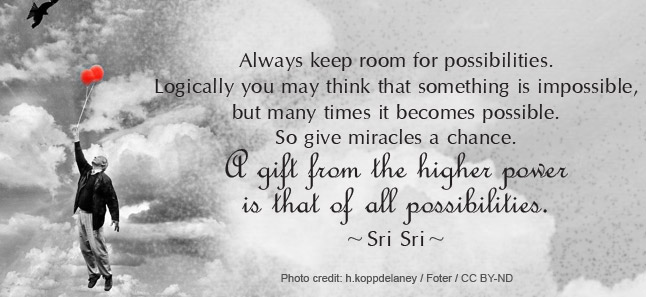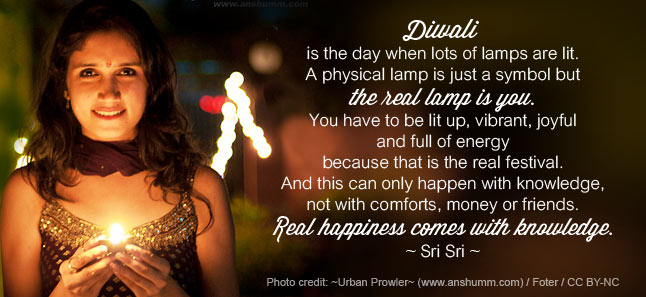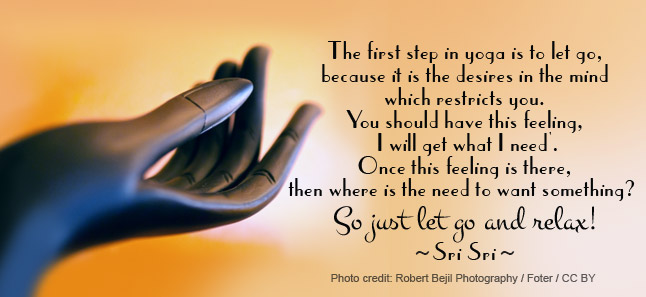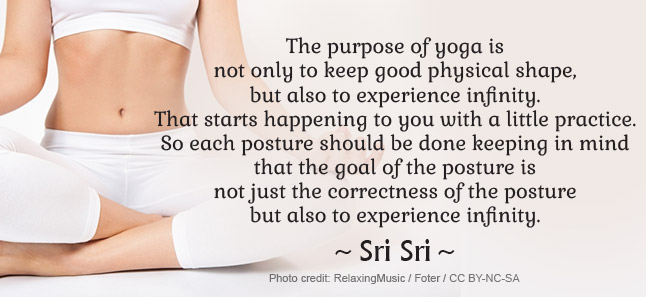Sun, 10/12/2014 Quebec, Canada

There is one thing that everybody is seeking for, and that is happiness. It is not that people don’t find, they do find happiness but it doesn’t last too long. It is momentary; for couple of hours, or one or two days. But the tendency of the spirit is to find everlasting happiness; happiness that doesn’t turn bitter.
I would like to tell you a small story. There was a gentleman who was looking in front of his house for his keys which he had lost. He was looking for it under the street lights. A bunch of people came around to help him find the keys and they all started looking. Then one gentleman went and asked this guy, 'But tell me, where did you lose these keys?'
He said, 'I lost them inside the house'.
'But then why are you looking for it here?'
He said, 'I lost them inside the house'.
'But then why are you looking for it here?'
Every child is nothing but a bundle of joy but as we grow up, somewhere, we lose that joy.
The whole question is, how do we get back to the innocence we were born with?
The whole question is, how do we get back to the innocence we were born with?
It is very similar to what is happening in this world with everyone. Each one of us has abundant joy deep within us, yet we are looking for it somewhere outside.
Just remember, when we were kids what we used to do? We used to shout, play and enjoy. Every child is nothing but a bundle of joy but as we grow up, somewhere, we lose that joy. A child smiles 400 times a day. When a child grows up and becomes an adolescent, he smiles only 17 times a day, and when he becomes an adult, he smiles occasionally and that too when someone smiles. The whole question is, how do we reverse this? How do we get back to the innocence we were born with? How to smile back again? This is the quest.
So if you look at it, there are three things that stops us from being joyful like a child.
1. Prejudice
2. Insecurity
3. Stress
I don’t think there is any fourth thing. If you find any thing, tell me. Now we need to get rid of all these three.
Just remember, when we were kids what we used to do? We used to shout, play and enjoy. Every child is nothing but a bundle of joy but as we grow up, somewhere, we lose that joy. A child smiles 400 times a day. When a child grows up and becomes an adolescent, he smiles only 17 times a day, and when he becomes an adult, he smiles occasionally and that too when someone smiles. The whole question is, how do we reverse this? How do we get back to the innocence we were born with? How to smile back again? This is the quest.
So if you look at it, there are three things that stops us from being joyful like a child.
1. Prejudice
2. Insecurity
3. Stress
I don’t think there is any fourth thing. If you find any thing, tell me. Now we need to get rid of all these three.
Stress we can get rid of by making using of the breath. There are number of breathing techniques that help us relax and get back a lot of energy. If you ask me what is stress, I don’t know, but I see people having it. And when I analyse, I see stress is wanting to do a lot but having no energy and no time.
Now, either you have to reduce your needs or increase your energy. In these two things, what is most practical is not reducing your needs but increasing your energy levels. So breathing exercises, pranayama, meditation, yoga, all these increase the energy level in a short time of 15 to 20 minutes. If we relax consciously through meditation, it raises our energy levels equivalent to 6 to 8 hours of sleep.
Relaxation that you get from sleep is dull relaxation. Another kind of relaxation is conscious relaxation. That relaxation brings your energy levels higher. That is called meditation.
Meditation is not sitting and thinking something. It is going to the source of thought. So reducing and eliminating stress is the first thing.
Now, either you have to reduce your needs or increase your energy. In these two things, what is most practical is not reducing your needs but increasing your energy levels. So breathing exercises, pranayama, meditation, yoga, all these increase the energy level in a short time of 15 to 20 minutes. If we relax consciously through meditation, it raises our energy levels equivalent to 6 to 8 hours of sleep.
Relaxation that you get from sleep is dull relaxation. Another kind of relaxation is conscious relaxation. That relaxation brings your energy levels higher. That is called meditation.
Meditation is not sitting and thinking something. It is going to the source of thought. So reducing and eliminating stress is the first thing.
Relaxation that you get from sleep is dull relaxation. Another kind of relaxation is conscious relaxation. That relaxation brings your energy levels higher. That is called meditation.
Second is to get rid of prejudice. There are many types of prejudice. There is prejudice between generations. Young people will not sit and share their heart out with senior citizens. There is generation gap. You find this all over the world. People of certain age group only stay together and talk together. They don’t open up and mix with elders or people younger than them.
There is prejudice about class, and about gender as well. May not be so much here in Canada but in many parts of the world, there is prejudice against gender and prejudice about religion, culture, language, and so on. So many types of prejudices. Wisdom is to rise above prejudice and see the whole world as one family.
If this idea of the whole world as one family comes, there will be no war, no crime and none of the problems that we are facing in the world today. See how many people are being killed. There is so much violence in the world. This is all because of lack of a broad vision and wisdom.
There is prejudice about class, and about gender as well. May not be so much here in Canada but in many parts of the world, there is prejudice against gender and prejudice about religion, culture, language, and so on. So many types of prejudices. Wisdom is to rise above prejudice and see the whole world as one family.
If this idea of the whole world as one family comes, there will be no war, no crime and none of the problems that we are facing in the world today. See how many people are being killed. There is so much violence in the world. This is all because of lack of a broad vision and wisdom.
Third is insecurity. Insecurity of what? 'Oh, there is nobody for me. Who will take care of me?' I tell you, there is so much love and compassion on this planet, and there is a higher power which is all love and it will give us what we need when we need.
If you look at your own life, in the past, how many times have you felt insecure? See how that time has passed and how complete you are today. If you turn back and see, then all those moments you have spent feeling insecure, appears to be such a waste of time, isnt it? Count and see how much time you have spent being insecure in the past 20 years. How many times you felt insecure? How many days you spent in a gloomy mood? It looks like such a waste of time and energy, and not only that, it created toxins in your body. Your health gets disturbed by a feeling of insecurity.
Three things you must do:
If you look at your own life, in the past, how many times have you felt insecure? See how that time has passed and how complete you are today. If you turn back and see, then all those moments you have spent feeling insecure, appears to be such a waste of time, isnt it? Count and see how much time you have spent being insecure in the past 20 years. How many times you felt insecure? How many days you spent in a gloomy mood? It looks like such a waste of time and energy, and not only that, it created toxins in your body. Your health gets disturbed by a feeling of insecurity.
Three things you must do:
Wisdom is to rise above prejudice and see the whole world as one family.
If this idea comes, there will be no war, no crime and none of the problems that we are facing in the world today.
There is so much violence in the world. This is all because of lack of wisdom.
If this idea comes, there will be no war, no crime and none of the problems that we are facing in the world today.
There is so much violence in the world. This is all because of lack of wisdom.
1. Look back in the past and see that it was futile feeling insecure. This gives you strength
2. Know that there are good people on this planet. They will always come to your help
3. There is a power which is going to guide you and help you out
So with this wisdom and understanding, get over insecurity.
2. Know that there are good people on this planet. They will always come to your help
3. There is a power which is going to guide you and help you out
So with this wisdom and understanding, get over insecurity.
Now, once you have gotten over stress, gotten over insecurity and you have overcome prejudice, then you are like a child, full of joy, and happiness simply wells. It was already there, it is covered by these three things and once you removed all these three things, it becomes obvious.
So with meditation, yoga and breathing techniques, get over stress. With wisdom, get over prejudice, and reflecting on your own life and having the confidence and faith, get over insecurity.
So with meditation, yoga and breathing techniques, get over stress. With wisdom, get over prejudice, and reflecting on your own life and having the confidence and faith, get over insecurity.



